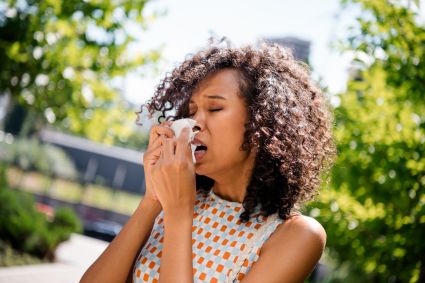When most people think of allergies, spring might be the first season that comes to mind. But for many Iowans, allergy symptoms don’t stop when the flowers fade—they just change. Summer brings its own set of allergy triggers, and understanding them can help allergy sufferers enjoy the season a whole lot more. Let’s break down what causes summer allergies, how they’re different from springtime allergies, and what you can do to manage them.
How summer allergies are different than spring allergies
Iowa’s warm, humid summers can be beautiful, but they also create the perfect environment for allergy triggers. While spring allergies usually come from tree pollen, summer allergies are typically caused by grass pollen and mold spores.
Here are some common summer allergens in Iowa:
- Grass pollens like Timothy or Kentucky bluegrass
- Mold spores that thrive in humid conditions
- Indoor irritants, like dust mites, made worse by air conditioning
Even when pollen counts seem lower, summer allergies can still feel intense. Humidity can make symptoms linger, and cold, dry air from A/C units may irritate sensitive nasal passages.
Beyond the typical symptoms
You probably know the usual allergy symptoms—sneezing, runny nose, itchy eyes—but summer allergies can show up in more subtle ways, too.
Some less obvious symptoms include:
- Feeling unusually tired during the day
- Difficulty falling or staying asleep
- Sinus pressure or frequent headaches
If you already deal with ENT issues like chronic sinusitis or ear pressure, summer allergies can make them worse. It’s important to manage symptoms early to prevent complications.
Tips for managing summer allergies
You don’t have to stay indoors all summer to find relief. With a few simple habits, you can reduce exposure and ease your symptoms.
Try these tips:
- Keep windows and doors closed, especially during high pollen times
- Wash your bedding weekly in hot water to kill allergens
- Shower and change clothes after spending time outside
- Use a dehumidifier indoors to help reduce mold growth
- Plan outdoor activities for early morning, when pollen counts are usually lower
- Check local pollen forecasts and avoid peak allergy times when possible
Small changes can make a big difference in how you feel.
If allergy symptoms are sticking around no matter what you try—or if they’re making existing issues worse—it might be time to see a specialist. Signs you could benefit from professional help include:
- Ongoing nasal congestion
- Frequent sinus infections
- Trouble breathing or worsening asthma
- Symptoms that interfere with daily life or sleep
Iowa ENT Center can help
At Iowa ENT Center, we’re experts in evaluating and treating allergies. Our team offers comprehensive care, from accurate allergy testing to personalized treatment plans and long-term relief through immunotherapy. If summer allergies are getting in the way of your day-to-day life, we’re here to help.
Learn more about our allergy services. Or call us at 515-223-4368 to schedule an evaluation.
